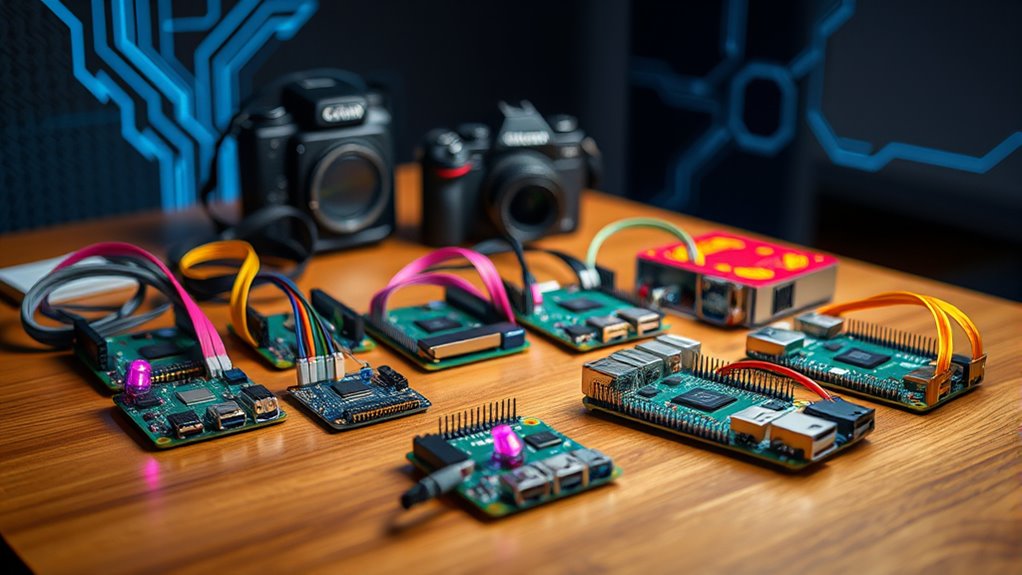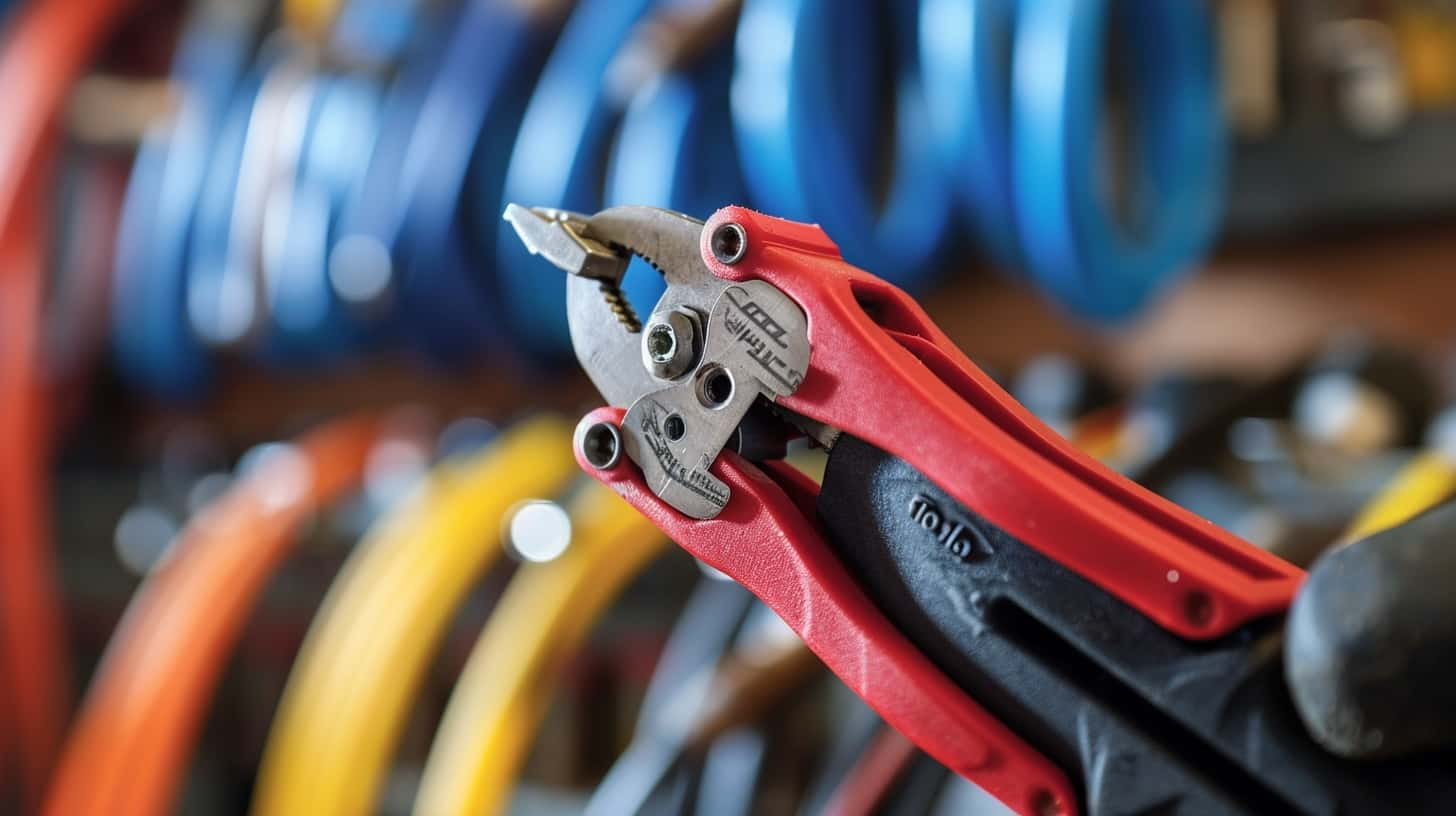I’ve compiled a list of the 15 best Raspberry Pi starter kits for 2025 to help you jumpstart your projects. Whether you’re a beginner or an experienced maker, these kits offer everything from pre-installed OS to extensive components, tutorials, and support for various Pi models. Each kit suits different needs, from media projects to robotics. Keep exploring, and you’ll discover detailed options to find the perfect one for your next adventure.
Key Takeaways
- The list features top-rated kits suitable for beginners and experienced users in 2025.
- Each kit includes essential components like Raspberry Pi boards, accessories, and tutorials.
- Compatibility with latest Raspberry Pi models (Pi 4, Pi 5, Zero) is emphasized.
- Options cater to various projects such as media, gaming, IoT, and robotics.
- Pros and cons help compare performance, ease of use, and included features for informed choices.
GeeekPi Raspberry Pi 4 Starter Kit (4GB)
The GeeekPi Raspberry Pi 4 Starter Kit (4GB) is an excellent choice for hobbyists and beginners who want a complete, ready-to-go setup. It features a powerful 64-bit quad-core ARM Cortex-A72 CPU, 4GB DDR4 RAM, and integrated graphics, making it versatile for various projects. The kit includes a Raspberry Pi 4B, a quiet cooling fan, heatsinks, a high-speed 64GB SD card, and essential cables. Its compact size and support for 4K resolution ensure smooth media playback, while user reviews highlight easy assembly, high performance, and great value. Overall, this kit offers everything you need to start exploring, learning, and building right away.
Best For: hobbyists, beginners, and DIY enthusiasts seeking a complete and versatile Raspberry Pi 4B setup for various projects.
Pros:
- Includes all essential components for immediate use, such as cooling fan, heatsinks, SD card, and cables
- Supports 4K resolution and multiple OS options like Linux, Kali Linux, and RetroPie
- Compact design with high performance for media, gaming, and development projects
Cons:
- SD card lifespan may be limited with prolonged heavy use
- Occasional HDMI connector looseness can affect display stability
- Potential shipping defects or hardware connectivity issues reported by some users
SunFounder Da Vinci Starter Kit for Raspberry Pi 5 4B 3B B+ 400, Zero 2 W
If you’re new to electronics or want a complete starter experience, the SunFounder Da Vinci Starter Kit is an excellent choice. It offers over 300 components, 150 projects, and 70 tutorial videos, making learning accessible and fun. Compatible with Raspberry Pi 5, 4B, 3B, B+, 400, and Zero 2 W, it supports multiple programming languages like Python, C, Java, Node.js, and Scratch. The kit includes sensors, LEDs, LCDs, and more, with thorough documentation suitable for beginners. While it doesn’t include a Raspberry Pi, it provides a comprehensive, well-supported platform for exploring robotics, IoT, and programming in one package.
Best For: beginners and hobbyists interested in learning electronics, programming, and IoT projects with a comprehensive and beginner-friendly Raspberry Pi starter kit.
Pros:
- Includes over 300 components and 150 projects, offering extensive learning opportunities.
- Supports multiple programming languages such as Python, C, Java, Node.js, and Scratch, providing versatility.
- Comes with detailed documentation, tutorials, and expert-led videos to facilitate easy learning for all skill levels.
Cons:
- Does not include a Raspberry Pi, so users must purchase it separately.
- Some users report outdated sample code and minor translation errors in the documentation.
- Occasional feedback about low-quality components or features like the LCD display brightness.
Freenove Raspberry Pi Starter Kit (Includes 223 Items & 128 Projects)
Designed for beginners, hobbyists, and students passionate to learn electronics and programming, the Freenove Raspberry Pi Starter Kit offers a thorough collection of components and projects that make hands-on learning accessible. With 223 items like sensors, motors, displays, and wires, it supports multiple Raspberry Pi models, including 4B, 3B+, and Zero W. The kit features a detailed 962-page tutorial and 128 projects, covering everything from basic wiring to complex applications using Python, C, Java, Scratch, and Processing. Customers praise its all-encompassing guidance and support, making it an excellent choice for anyone enthusiastic to explore electronics, coding, and hardware interaction in a structured way.
Best For: beginners, hobbyists, and students eager to learn electronics and programming through hands-on projects with comprehensive guidance.
Pros:
- Extensive 962-page tutorial and 128 projects catering to all skill levels
- Supports multiple programming languages including Python, C, Java, Scratch, and Processing
- Includes a wide variety of components like sensors, motors, displays, and wires for versatile experimentation
Cons:
- The container may not accommodate all components for very extensive projects
- Some users have noted that certain instructions could be updated for clarity
- Requires a separate Raspberry Pi unit, which is not included in the kit
SunFounder Raphael Starter Kit for Raspberry Pi (Raspberry Pi Not Included)
Beginners aged 10 and up will find the SunFounder Raphael Starter Kit an ideal way to explore Raspberry Pi programming, electronics, and IoT projects. Compatible with models like Raspberry Pi 5, 4B, 3B+, and Zero 2 W, it offers over 337 components supporting 161 projects and 70+ video tutorials. While you’ll need to purchase your Raspberry Pi separately, this kit provides a wide range of parts, including sensors, actuators, LEDs, and cameras, to foster hands-on learning. The detailed online tutorials, created by educator Paul McWhorter, make complex concepts accessible, making it a valuable resource for beginners enthusiastic to experiment and build their skills.
Best For: beginners aged 10 and up interested in learning Raspberry Pi programming, electronics, and IoT projects with comprehensive online tutorials and a wide range of hardware components.
Pros:
- Extensive collection of over 337 components supporting numerous projects and tutorials
- User-friendly online step-by-step tutorials created by educator Paul McWhorter
- Compatible with various Raspberry Pi models, making it versatile for different setups
Cons:
- Requires a separate purchase of the Raspberry Pi board itself
- Some components like resistors and breadboards may be fragile or of lower quality
- No printed instructions; all guidance is available online, which may be less convenient for some users
CanaKit Raspberry Pi 5 Starter Kit PRO (128GB Edition, 8GB RAM)
The CanaKit Raspberry Pi 5 Starter Kit PRO (128GB Edition, 8GB RAM) stands out as an ideal choice for users seeking a powerful, ready-to-use mini-computer capable of handling demanding multitasking and multimedia projects. It features the Raspberry Pi 5 with 8GB of RAM, a 2.4GHz quad-core processor, and a pre-installed Raspberry Pi OS on a 128GB EVO+ Micro SD Card. The kit includes a sturdy black case, cooling fan, heat sink, and a 45W power supply. Supporting 4K dual HDMI displays, WiFi 5G, Bluetooth 5.0, and gigabit Ethernet, it’s perfect for media centers, automation, or development tasks, all in a compact, easy-to-assemble package.
Best For: hobbyists, developers, and media enthusiasts seeking a powerful, versatile mini-computer for multitasking, media playback, and DIY projects.
Pros:
- High-performance 8GB RAM and quad-core processor support demanding applications and multitasking
- Supports dual 4K HDMI displays, WiFi 5G, Bluetooth 5.0, and gigabit Ethernet for versatile connectivity
- Comes with a sturdy black case, cooling system, and pre-installed OS, enabling quick setup and reliable operation
Cons:
- Some users may experience minor issues with cables or accessories, though replacements are straightforward
- The initial setup, while generally easy, might be challenging for absolute beginners without prior experience
- Limited to microSD card storage unless upgraded, which may affect performance for some intensive use cases
CanaKit Raspberry Pi 4 4GB Starter PRO Kit – 4GB RAM
If you’re looking for an affordable and reliable way to explore various tech projects, the CanaKit Raspberry Pi 4 4GB Starter PRO Kit is an excellent choice. It includes a Raspberry Pi 4 with a 1.5GHz quad-core CPU, 4GB of RAM, and a pre-loaded microSD card, making setup quick and straightforward. The kit features high-quality components like a premium case with an integrated fan, heat sinks, and a low-noise fan for effective cooling. Powering via USB-C, it supports 4K60p HDMI output. Overall, it’s versatile, user-friendly, and perfect for hobbyists, students, or anyone looking to immerse themselves in media centers, servers, or programming projects.
Best For: hobbyists, students, and beginners seeking a reliable and versatile platform for media, programming, and DIY tech projects.
Pros:
- Easy setup with pre-loaded microSD card and comprehensive accessories
- Powerful 1.5GHz quad-core CPU and 4GB RAM for smooth multitasking
- High-quality cooling components including heat sinks and integrated fan
Cons:
- Limited storage capacity with the included microSD card, which may require upgrades for larger projects
- Possible display issues if HDMI connections are not properly seated or compatible monitors are used
- Power supply limitations can affect device performance during demanding tasks
Seeed Studio Raspberry Pi 5 Starter Kit (4GB RAM, 128GB SD Card, Official Case and Cooler)
The Seeed Studio Raspberry Pi 5 Starter Kit is an excellent option for users seeking a versatile and powerful single-board computer right out of the box. It features 4GB RAM, a 2.4GHz quad-core ARM Cortex-A7 processor, and a 128GB pre-installed SD card with Raspberry Pi OS for quick setup. The kit includes an official case with advanced cooling, a 27W power supply, HDMI, and network cables. Its small size and multiple ports support a wide range of projects, from media servers to home automation. While some users report power loss issues, its speed, reliability, and strong community support make it a top choice for both beginners and experienced users.
Best For: hobbyists, students, and professionals seeking a powerful, ready-to-use compact computer for projects like media servers, home automation, or learning Linux.
Pros:
- Comes with a pre-installed 128GB SD card and official accessories for quick setup
- Equipped with a high-performance 2.4GHz quad-core ARM Cortex-A7 processor and 4GB RAM for smooth multitasking
- Advanced cooling system and official case ensure reliable operation during intensive tasks
Cons:
- Some users report unreliable booting after power interruptions, affecting always-on projects
- Slightly higher price point due to bundled accessories and premium components
- Limited to 4GB RAM in this version, which may be insufficient for very heavy workloads
SunFounder Raspberry Pi Pico W Starter Kit with Tutorials
Are you a beginner excited to plunge into IoT and microcontroller projects? The SunFounder Raspberry Pi Pico W Starter Kit is perfect for you. It includes over 450 components and supports MicroPython, C/C++, and Arduino IDE, making it versatile for various programming styles. With 117 projects and detailed tutorials led by educator Paul McWhorter, you’ll learn quickly and confidently. The kit features sensors, LEDs, LCDs, and more, plus online resources and community support. Its compact design and high-quality parts provide an engaging, hands-on experience. Whether you’re new to electronics or looking to expand your skills, this kit offers a thorough, beginner-friendly introduction to microcontroller projects.
Best For: beginners and hobbyists interested in exploring IoT, microcontroller programming, and electronics projects with comprehensive guidance and hands-on components.
Pros:
- Includes over 450 components and 117 projects for extensive learning and experimentation
- Supports multiple programming languages including MicroPython, C/C++, and Arduino IDE for versatility
- Comes with detailed tutorials and online resources, making it ideal for learners of all ages
Cons:
- Some users have experienced initial quality control issues like defective components or missing soldered legs
- The kit can be overwhelming for complete beginners due to its extensive parts and project options
- The size and weight of the kit (1.74 pounds, 9.84 x 6.5 x 2.56 inches) may be less portable for on-the-go projects
Freenove Raspberry Pi Starter Kit (Raspberry Pi NOT Included)
Designed for hobbyists, students, and educators, the Freenove Raspberry Pi Starter Kit offers a complete collection of 386 components, modules, sensors, and accessories compatible with various Raspberry Pi models. Keep in mind, the Raspberry Pi itself isn’t included, so you’ll need to purchase it separately. The kit provides essential parts like jumper wires, sensors, LEDs, motors, LCDs, and a labeled GPIO interface, making it versatile for many projects. It also includes a detailed 1170-page downloadable tutorial with instructions, schematics, and code in multiple languages. While some components may need adjustments, the kit is praised for its extensive educational resources and project variety, ideal for beginners and educators.
Best For: hobbyists, students, and educators looking for a comprehensive starter kit to learn electronics and programming with Raspberry Pi.
Pros:
- Extensive set of 386 compatible components, modules, sensors, and accessories suitable for a wide range of projects
- Detailed 1170-page downloadable tutorials covering multiple programming languages and electronics fundamentals
- Supports various Raspberry Pi models, making it versatile and adaptable for different devices
Cons:
- Some components, like breadboards and jumper wires, are of low quality or may require modifications
- The kit does not include the Raspberry Pi itself, so it must be purchased separately
- The digital-only tutorials may be inconvenient for users preferring printed or offline materials
LAFVIN Basic Starter Kit for Raspberry Pi Pico,LCD1602,SG90 with Tutorail
If you’re new to microcontroller projects and want an affordable, all-in-one kit to get started, the LAFVIN Basic Starter Kit for Raspberry Pi Pico is an excellent choice. It includes essential components like an LCD1602 display, SG90 servo motor, LEDs, switches, and sensors, all compatible with Raspberry Pi Pico’s RP2040 microcontroller. The kit supports MicroPython, C, and Piper Make programming languages, making it accessible for beginners. It comes with extensive tutorials that guide you through building projects such as flashing LEDs and digital thermometers. Priced around sixteen dollars, it offers great value and a hands-on learning experience.
Best For: beginners and hobbyists seeking an affordable, comprehensive starter kit to learn microcontroller programming and electronics with Raspberry Pi Pico.
Pros:
- Includes a variety of components and detailed tutorials suitable for beginners
- Supports multiple programming languages: MicroPython, C, and Piper Make
- Offers good value at an affordable price point with positive customer reviews
Cons:
- Some components, like jumper wires, may be defective or of lower quality
- The tutorial may gloss over complex MicroPython concepts, challenging complete beginners
- Product description incorrectly mentions Bluetooth and CDs, causing potential confusion
LAFVIN Raspberry Pi Starter Kit (Compatible with Pi 5/4/4B/3B/3B+)
The LAFVIN Raspberry Pi Starter Kit stands out as an excellent choice for beginners and hobbyists enthusiastic to explore electronics and programming. It’s compatible with Raspberry Pi models 5, 4B, 3B+, and more, offering a wide range of components for diverse projects. The kit includes sensors, displays, motors, and modules, enabling automation, robotics, and data collection. With detailed tutorials in Python, C, Java, and Scratch, it makes learning accessible and engaging. Organized packaging, extensive documentation, and positive reviews make this kit perfect for STEM education, DIY projects, or gifting. Priced around $32.99, it’s a versatile, value-packed starter for all skill levels.
Best For: beginners, students, and hobbyists interested in learning electronics, programming, and creating DIY projects with Raspberry Pi.
Pros:
- Comprehensive set of components suitable for a wide range of projects
- Supports multiple programming languages including Python, C, Java, and Scratch
- Detailed tutorials and organized packaging enhance the learning experience
Cons:
- Initial setup may be overwhelming for absolute beginners
- Slightly heavier and larger compared to basic starter kits
- Requires some familiarity with Raspberry Pi to maximize its potential
Vilros Raspberry Pi Zero 2 W Starter Kit
The Vilros Raspberry Pi Zero 2 W Starter Kit is an ideal choice for beginners and DIY enthusiasts who want to explore compact computing projects. It features the Raspberry Pi Zero 2 W, with a 1GHz quad-core ARM Cortex-A53 CPU, 512MB RAM, and built-in Wi-Fi and Bluetooth. The kit includes a multi-purpose case, power supply, HDMI adapter, camera module connector, and other essential accessories. Designed for all Pi Zero models, it supports media, IoT, and custom projects. While it requires an SD card (not included), its extensive components and user-friendly setup make it perfect for headless, low-power applications.
Best For: beginners, DIY enthusiasts, and hobbyists seeking a compact, versatile computing platform for media, IoT, and custom projects.
Pros:
- Includes comprehensive accessories for quick setup and versatile use
- Supports headless operation and various customization options
- User-friendly design suitable for beginners and advanced users alike
Cons:
- Requires an external SD card (not included) for software and storage
- No built-in USB hub, which may limit peripheral connectivity without additional accessories
- Slightly higher price point without the SD card included
SunFounder Raphael Starter Kit for Raspberry Pi 4 and Zero 2 W
Designed specifically for beginners aged 10 and up, the SunFounder Raphael Starter Kit offers an all-encompassing learning experience for those new to Raspberry Pi projects. With over 337 components, it supports 161 projects and 70+ tutorial videos, making it perfect for hands-on learning in electronics, programming, and IoT. Compatible with Raspberry Pi 4 and Zero 2 W, the kit includes sensors, LEDs, cameras, and more. While it requires a separate Pi board, the extensive online resources and detailed schematics help beginners build confidence. It’s an excellent choice for exploring Python, C, Scratch, and other programming languages, fostering creativity and experimentation.
Best For: beginners aged 10+ interested in learning Raspberry Pi programming, electronics, and IoT through hands-on projects and comprehensive online tutorials.
Pros:
- Over 337 components supporting 161 projects and 70+ video tutorials for a rich, engaging learning experience
- Compatibility with multiple Raspberry Pi models including Pi 4, Zero 2 W, and Pi 5, offering versatility for different setups
- Extensive online resources, schematics, and sample code that facilitate step-by-step learning and experimentation
Cons:
- Some components, such as resistors and breadboards, may be fragile or of lower quality, requiring careful handling
- No printed instructions; all guides and tutorials are accessible online, which may be inconvenient for some users
- Occasional issues with hardware components like cameras or sensors not being detected or being fragile during assembly
7 in 1 Breadboard Power Module Kit for Arduino and Raspberry Pi
Are you looking for an affordable, all-in-one power solution to jumpstart your Arduino or Raspberry Pi projects? The 7 in 1 Breadboard Power Module Kit offers two solderless breadboards, power modules, a 9V power supply, splitter cable, and jumper wires. While it’s versatile, build quality can be hit or miss, with some components needing force or bending to fit. The power modules have limited capacity and safety concerns, like potential over-voltage. Customer reviews highlight issues like loose contacts and fragile switches. Despite these flaws, the kit provides a convenient starting point, but be prepared for troubleshooting and possible modifications for reliable operation.
Best For: hobbyists and students seeking an affordable all-in-one power and prototyping kit for Arduino and Raspberry Pi projects.
Pros:
- Includes two solderless breadboards and multiple jumper wires for versatile prototyping.
- Comes with a 9V/1A power supply and splitter cable, simplifying power distribution.
- Provides adjustable voltage power modules with LEDs and switches for easy control.
Cons:
- Build quality is mediocre, with issues like bent pins and poor solder joints.
- Limited power capacity and potential safety risks due to design flaws.
- Customer reviews report unreliable contacts, fragile switches, and components requiring force or modification.
SunFounder Raspberry Pi Pico W Starter Kit with Tutorials
Looking for an easy way to learn IoT and microcontroller programming? The SunFounder Raspberry Pi Pico W Starter Kit with Tutorials is perfect for beginners of all ages. It comes with over 450 components and supports MicroPython, C/C++, and Arduino IDE, enabling diverse projects. The kit features sensors, LEDs, LCDs, and more, plus 27 step-by-step video tutorials by Paul McWhorter, making complex concepts accessible. With online support and community forums, you’ll never feel stuck. The Pico W’s wireless capabilities and versatile programming options make it ideal for hands-on learning, whether you’re just starting out or expanding your skills in IoT.
Best For: beginners of all ages interested in learning IoT, microcontroller programming, and hands-on electronics projects with comprehensive tutorials and versatile programming support.
Pros:
- Extensive set of over 450 components and 117 projects for versatile experimentation
- 27 detailed video tutorials by expert Paul McWhorter, making complex concepts accessible
- Supports multiple programming languages (MicroPython, C/C++, Arduino IDE) and includes online resources and community support
Cons:
- Initial quality control issues such as defective breadboards or missing soldered legs on sensors reported by some users
- Larger size (9.84 x 6.5 x 2.56 inches) may require ample space for setup and storage
- Slightly heavier weight (1.74 pounds) may be less portable for on-the-go projects
Factors to Consider When Choosing Raspberry Pi Starter Kits

When choosing a Raspberry Pi starter kit, I always check if it’s compatible with my specific model to avoid any issues. I also consider the variety of components included, since more tools mean more project possibilities, and I look at the quality of educational resources to help me learn effectively. finally, I pay attention to ease of assembly, as well as power and cooling solutions, to guarantee a smooth and reliable experience.
Compatibility With Models
Choosing the right Raspberry Pi starter kit requires paying close attention to compatibility with your specific model, such as Pi 4, Pi Zero, or Pi 5. It’s essential to guarantee the kit explicitly states compatibility with your device. Some kits support multiple models, which is helpful if you plan to upgrade or switch between versions later. Also, verify that the included accessories match your Pi’s hardware, like GPIO pin counts and power requirements. Compatibility with your preferred operating system, whether Raspberry Pi OS or others, is equally important. Always review product descriptions or manufacturer details to confirm the kit is designed for your specific Raspberry Pi model. This careful checking helps avoid issues and ensures a smooth setup process.
Included Components Variety
A diverse selection of components in a Raspberry Pi starter kit considerably expands your project possibilities and learning opportunities. When a kit includes sensors, actuators, displays, and modules, it opens the door to a wider range of applications, from robotics to IoT projects. Kits with over 200 components support complex tasks like automation, providing a richer hands-on experience. Including various electronic parts, cables, and connectors helps you grasp different hardware interfaces and wiring techniques, boosting your practical skills. Having multiple programming-compatible components—like LEDs, motors, and relays—allows experimentation across different coding languages and software environments. Overall, a thorough component selection reduces the need for extra purchases, making your learning process more seamless and your projects more ambitious.
Educational Resources Quality
Ever wondered how the quality of educational resources can impact your learning experience with a Raspberry Pi starter kit? High-quality guides, tutorials, and wiring diagrams make a huge difference by providing clear, step-by-step instructions. Good resources support multiple programming languages like Python, C, Java, and Scratch, helping you expand your skills. Access to video tutorials, troubleshooting forums, and downloadable docs can boost your understanding and increase your chances of success. Accurate, up-to-date content prevents confusion from outdated code or faulty diagrams. Plus, beginner-friendly explanations and gradually challenging projects help build your confidence while developing practical skills. Overall, the better the educational resources, the smoother and more rewarding your Raspberry Pi learning journey will be.
Ease of Assembly
When selecting a Raspberry Pi starter kit, ease of assembly should be a top priority because it considerably affects your overall experience. A kit with clearly labeled components and organized storage makes identifying parts straightforward, saving you time and frustration. Detailed, step-by-step instructions or tutorials help reduce confusion and speed up setup. Pre-wired modules and plug-and-play components simplify connections, allowing for quicker assembly. Kits that are compact and modular, avoiding complex wiring or soldering, are especially beginner-friendly. Features like color-coded jumper wires and standardized connectors further minimize errors and streamline the process. Overall, choosing a kit built with ease of assembly in mind ensures a smoother start, keeps frustration low, and allows you to focus on your projects rather than troubleshooting setup issues.
Power and Cooling Solutions
Are you making sure your Raspberry Pi stays powered and cool during intensive projects? Reliable power solutions are essential, so look for kits with stable power supplies like USB-C or Power Delivery chargers to keep things running smoothly. Proper cooling is just as important; heatsinks, fans, or cases with built-in cooling systems help prevent overheating and maintain peak performance. Adding a PWM fan or active cooling components can reduce thermal throttling during long sessions. Ensuring good airflow within the case and using quality thermal interface materials help dissipate heat effectively from the CPU and other components. Additionally, monitoring temperature levels with built-in sensors or external tools allows you to manage power and cooling proactively, ensuring your Pi operates reliably even under heavy workloads.
Expansion Potential
Choosing a Raspberry Pi starter kit with good expansion potential guarantees your projects can grow and adapt over time. I look for kits that include GPIO pins and connectors supporting additional modules and sensors, making future upgrades straightforward. Compatibility with expansion boards or HATs is also key, as it allows me to add functionalities like cameras, motor drivers, or extra storage easily. I also check if the kit supports multiple programming languages and software frameworks, ensuring flexibility when integrating new hardware. Physical design matters too—modular setups save time and effort during expansion without requiring major disassembly. Ultimately, I consider the availability of a broad range of compatible components, such as sensors and communication modules, so I can continuously extend my project’s capabilities without hassle.
Price and Value
Evaluating the price and value of a Raspberry Pi starter kit helps make certain you’re getting the most for your money. I look at the total cost in relation to the number and quality of components included—better kits offer good value by combining essential parts like power supplies, cables, and cases without extra expenses. It’s also helpful to compare the kit’s price with buying components separately to see if you’re saving money. Additionally, consider kits that provide detailed tutorials and support, which can boost your learning without additional costs. Keep in mind, lower-priced kits might cut corners on quality or completeness, potentially leading to extra expenses for replacements or upgrades later. Balancing cost and quality ensures you get a reliable kit that supports your projects without unnecessary spending.
Frequently Asked Questions
What Are the Most Beginner-Friendly Raspberry Pi Starter Kits?
You’re wondering which Raspberry Pi starter kits are most beginner-friendly. I recommend kits that include all necessary components like a Raspberry Pi board, power supply, pre-installed SD card, and easy-to-follow instructions. These kits simplify setup and help you learn quickly without extra hassle. Look for those with all-inclusive guides and user support, making your first projects smooth and enjoyable. They’re perfect for diving into the world of Raspberry Pi with confidence.
Which Kits Offer the Best Value for Money?
When considering the best value for money, I look for kits that include essential components without overspending. I’ve found that kits like the official Raspberry Pi Starter Kit or the CanaKit Raspberry Pi Starter Kit offer great bang for your buck, providing everything you need to start, plus extras for future projects. These kits strike a good balance between affordability and quality, making them perfect for beginners and seasoned hobbyists alike.
Are There Kits Suitable for Advanced Users or Specific Projects?
You’re asking if there are kits suitable for advanced users or specific projects. I’ve found that many kits cater to experienced hobbyists, offering advanced sensors, Raspberry Pi 4 or 400 boards, and specialized accessories like robotics or AI modules. These kits often come with detailed guides, making complex projects manageable. I recommend looking for kits that include high-performance components and tailored peripherals to match your specific project needs.
How Important Is Official Raspberry Pi Branding in Starter Kits?
The importance of official Raspberry Pi branding in starter kits is like the foundation of a sturdy house. It guarantees you’re getting genuine, high-quality components that work well together. I always look for official branding because it guarantees compatibility, reliability, and support. While third-party kits can be tempting, they might not offer the same assurance. For a smooth project start, sticking with official kits helps me avoid unnecessary headaches.
Do Starter Kits Include Software and Tutorials for Learning?
When I look for a starter kit, I always check if it includes software and tutorials because they’re essential for learning. Most kits I’ve used come with beginner-friendly guides and pre-installed software, making it easier to get started without extra hassle. These resources help me understand the hardware and develop projects confidently. So, yes, a good starter kit should definitely include tutorials and software to support your learning journey.
Conclusion
As you explore these starter kits, think of them as gentle gateways guiding you through a garden of endless possibilities. Each kit is like a stepping stone over a tranquil pond, inviting you to dip your toes into new projects. With patience and curiosity as your compass, you’ll find yourself blossoming into a confident creator, turning your ideas into vibrant realities. Embrace the journey—the adventure awaits just beyond the horizon.










